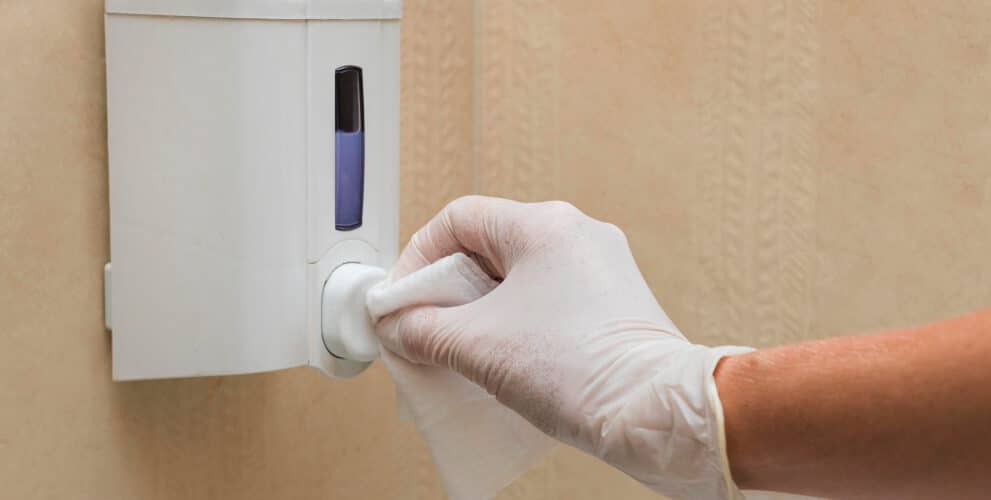Why paper towels might be your best bet for hygiene
Scientific studies reveal that electric hand dryers could disseminate germs, often making paper towels a more hygienic option for drying hands
Author
Author
- admin / 4 months

- 0
- 5 min read

Author
Hot-air hand dryers are a staple in most public restrooms in urban India now. Most people reach for these dryers over paper towels to dry their hands for a myriad of reasons— for some, it is the greener option, for others, it might even seem more hygienic.
However, a viral reel on Instagram calls for a rethink before reaching for the dryer, claiming it blasts you with bacteria.
“Black light tests showed they blast bacteria everywhere—your hands, your face, even your clothes. They suck in air filled with bathroom germs and blow it right back at you,” says the video, which has over 1.5 crore views on the platform.
The video, which is captioned “Why You Should NEVER Use Air Dryers in Public Bathrooms Again” and has close to 1.5 lakh likes, seems to suggest using paper towels over such dryers.
Are the facts true?
Researchers and experts have long maintained that drying your hands after washing them is an integral part of hand hygiene and is important to ensure that germs are not transferred.
“Careful hand drying is integral to the process of hand hygiene, which aims to optimise the removal of potentially pathogenic microorganisms. Ineffective hand drying results in wet hands that are an infection risk increasing the potential for cross-infection, occupational contact dermatitis for healthcare practitioners, harm to patients and environmental contamination,” according to one study.

So it is imperative that one dries their hands after washing them. However, the best way to dry them is still hotly contested.
“Germs can be transferred more easily to and from wet hands; therefore, hands should be dried after washing. However, the best way to dry hands remains unclear because few studies about hand drying exist, and the results of these studies conflict. Additionally, most of these studies compare overall concentrations of microbes, not just disease-causing germs, on hands following different hand-drying methods. Nonetheless, studies suggest that using a clean towel or air-drying hands are best,” according to the US Center for Disease Control.
The Cleveland Clinic, however, advises against air-drying. “Use a clean paper towel or hand towel to thoroughly dry your hands. It’s tempting to just shake out your hands and let them air dry. But research shows that it’s easier for germs to spread on wet hands versus dry ones,” it says.
But the large consensus appears to be that electric hand dryers are the least hygienic option. A 2012 review of 12 studies published between 1970 and 2011 found that “paper towels are superior to air dryers.”
“Most studies have found that paper towels can dry hands efficiently, remove bacteria effectively, and cause less contamination of the washroom environment. From a hygiene standpoint, paper towels are superior to air dryers; therefore, paper towels should be recommended for use in locations in which hygiene is paramount, such as hospitals and clinics,” it said.
About 6 years later, in 2018, researchers at the University of Connecticut and Quinnipiac University ascertained that electric air dryers did make bacteria worse. The researchers first exposed petri dishes to bathroom air for 2 minutes with the dryers off, and then exposed another set of petri dishes to the hot air from a bathroom dryer for 30 seconds. They found that the dishes exposed to just bathroom air averaged at 1 colony of bacteria or fewer per plate, whereas the ones exposed to the dryer air averaged at 18-60 colonies per plate.
To ascertain the source of this bacteria, they tried retrofitting the dryers with HEPA filters, arguing that “if the bacteria found on plates exposed to hand dryer air are coming from room air passing through hand dryers, then HEPA filters in the hand dryers should reduce bacterial surface deposition.”
This showed that while it did not completely eliminate the microbes, it significantly reduced them, showing that it was in fact coming from the dirty air in bathrooms. When someone flushes a toilet without closing the lid, it “aerosolizes fecal (sic.) waste from the movement of toilet water (i.e., bubbling, swirling, splashing).” These aerosolized faecal matter is then sucked up by the dryers and disseminated through the air.
This was in line with an earlier study, which found that “Bacterially contaminated air was found to be emitted whenever a warm air dryer was running, even when not being used for hand drying.”
A 2021 study with a very small sample reiterated these findings and found that “on average, the levels of contamination were 10-fold higher following jet air dryer use than after paper towel use.”
So next time you wash your hands, your best bet might just be to pick up a paper towel and dry your hands.
Also read: Visibly dirty surfaces, utensils and towels should certainly be cleaned regularly








